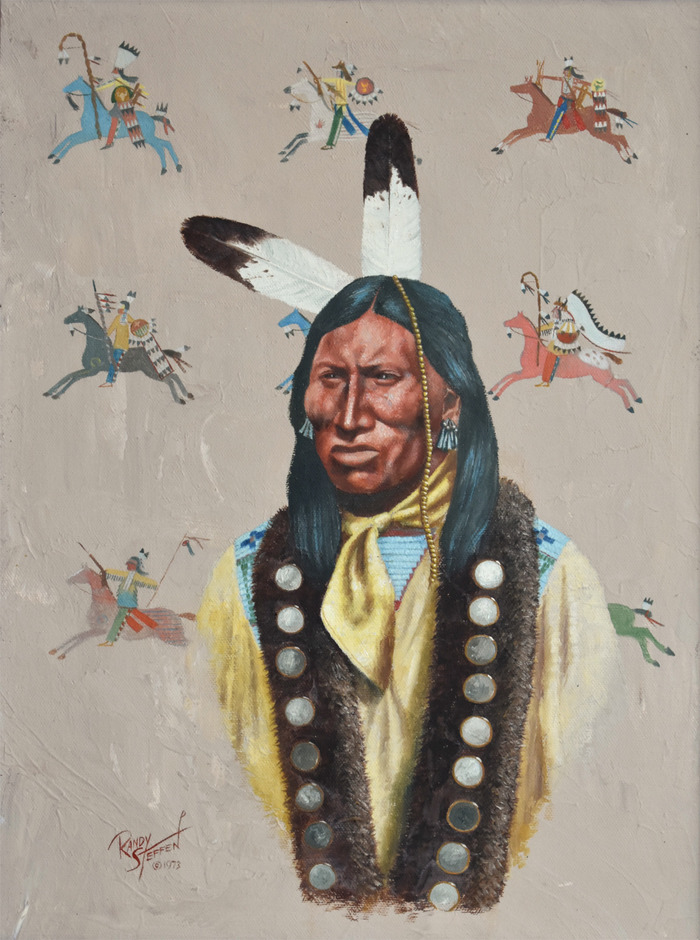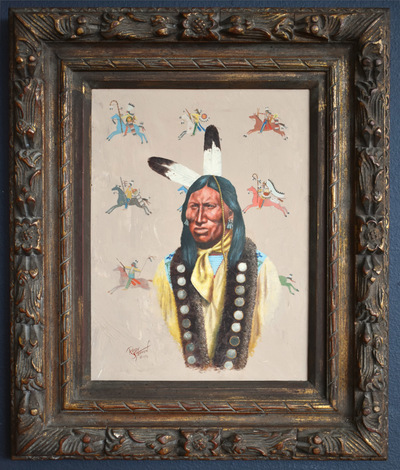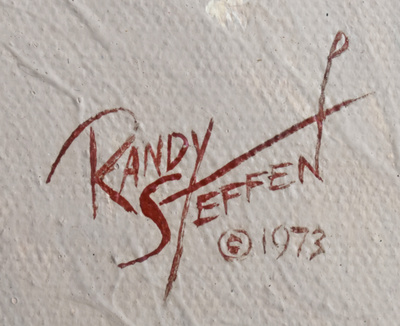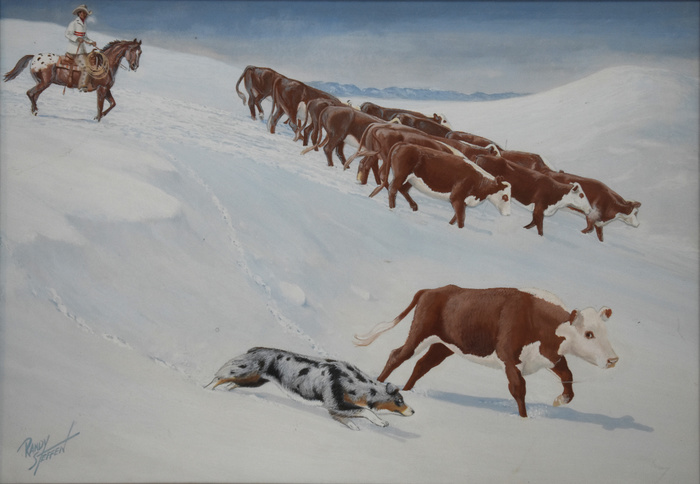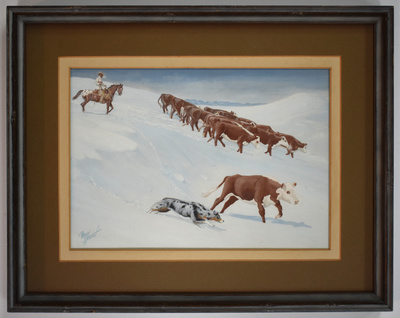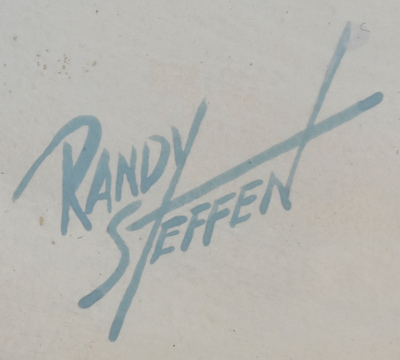Randy Steffen grew up around horses, which set the stage for his becoming a western artist, writer and researcher. He graduated high school in 1935, receiving an appointment to the United States Military Academy at West Point. While attending Stanton Preparatory Academy, a prerequisite for West Point, he waited tables and gave riding lessons. Soon after starting at West Point, he traded places with another cadet and transferred to the Naval Academy, graduating as an ensign in 1940. He was then deployed to Europe during WWII.
After the war, Steffen worked in civil engineering for a short period of time, and soon leased a ranch in Nevada, where he got involved in the training of horses. During this time, he began creating and selling art works, marking the beginning of his artistic career.
He was a man of many talents, and in 1948, he moved to Colorado Springs to design a new office building for the Western Horseman magazine. He trained polo ponies in California; worked as managing editor of a horse magazine in Cisco, Texas; and worked as a stuntman and stand-in for western movie stars in Hollywood. Here he began writing articles on a variety of topics, establishing a reputation as a solid writer and researcher. Among his articles are: United States Military Saddles; The Civil War Soldier; The American Sidesaddle; Indian-Fighting Cavalryman; Stagecoach! The Abbot-Downing Story; Saddles Through History; Bits Through History; Horse Equipment of the Plains Indians; and The American Stock Saddle.
On the basis of his extensive research about the personal gear and horse gear of the United States Cavalry, Steffen wrote a series of four books about the uniforms, arms, accouterments, and equipment of the cavalryman, entitled: The Horse Soldier 1776-1943, published in 1977, 1978, and 1979 by the University of Oklahoma Press.
In the late 1960s, Steffen concentrated on creating bronze sculptures and paintings, continuing through the mid 70s, though his health was failing him.
In 1974, he received one of two Americana Awards from American Airlines for his work in preserving American history. Then the Dallas area Bicentennial Commission selected him to receive its Bicentennial Award for promotion of American history through art and writing. They also nominated him for the Freedom Foundation George Washington Award, and on February 2, 1976, he was honored with the American Exemplar Award at Valley Forge.
Randy Steffen died January 17, 1977, at the age of 59. His ashes were scattered at the wildlife refuge near Cache, Oklahoma.
Source:
Westernhorseman.com

Marand Eugene "Randy" Steffen, Jr. (1917-1977)
From the late 1940s thru the 1970s, Randy Steffen was one of the most celebrated western artists in the United States. Heralded by connoisseurs, collectors, and members of the art world, he made a name for himself with his attention to detail, meticulous research, and knowledge of the Old West.
Born in Selinsgrove, Snyder County, PA, he was admitted to the Naval Academy at Annapolis, Maryland, in 1936. While at the Naval Academy he became a member of the Art Club and provided artwork for the student magazine, The Log. He moved to Nevada in the mid 1940s and seldom returned home.
He wrote and illustrated short articles for Zane Grey and Luke Short pulp paperbacks in the late 1940s and early 1950s. In 1950 Steffen moved to Cisco, Texas, created a new “back story” and for a short time took over the publication of the magazine, Back in The Saddle.
His artwork and articles were featured in The Leather Craftsman, Horse Lover’s Magazine, True West, and The Western Horseman, among others. He was often featured as the cover artist.
Randy Steffen moved from Texas to California – then to Florida and back to Texas. He died in Texas and his ashes were scattered over the Wichita Wildlife Refuge in Cache, Oklahoma, one of his favorite locales."
Submitted 2021 by: Gary Hawbaker

Randy Steffen did not grow up around horses and he was never appointed to West Point. These were stories he told. His parents would have had a horse drawn carriage in his early days, but his father had an automobile early on. While he made a statement in early newspaper references that he would either like to go to West Point or Annapolis, there is no primary source material that has him going to West Point.
He did not receive an appointment to the United States Military Academy at West Point. The appointment was to the Naval Academy. He did not trade places with another person. He did not graduate from the Naval Academy, and he did not go to Europe during WWII. He was married in Little Rock, AR in 1938 and welcomed his first child, a daughter, in 1939. His WWII draft registration places him in Lock Haven, Clinton County, PA in October of 1940.
Regards, Gary Hawbaker
(Note from Gary Hawbaker in response to the biography from Western Horseman website)

Article from the Snyder County Tribune dated March 12, 1936. Titled "Steffen Receives Appointment to Annapolis"
Mr. M. E. Steffen of South Market Street received word today from Congressman Ben K. Focht that his son, Marand, has been given a principal appointment to the United States naval Academy at Annapolis. Marand is at present a student at "Stanton on the Hudson" a preparatory school for Annapolis and West Point.
Splendid reports have come from the Prep School concerning Marand's work, and the Tribune join the many friends of the young man in wishing him all possible success in his entrance examinations, which he will likely be called upon to take very soon.
Selinsgrove can be proud of having so ambitious a young man as Marand as well as a wide-awake Congressman who never fails his Selinsgrove friends.
Submitted 2021 by Gary Hawbaker, who with the above text is refuting the Western Horseman article about Steffen that Steffen went to West Point.
** If you discover credit omissions or have additional information to add, please let us know at registrar@askart.com.
Share an image of the Artist: images@askart.com.
